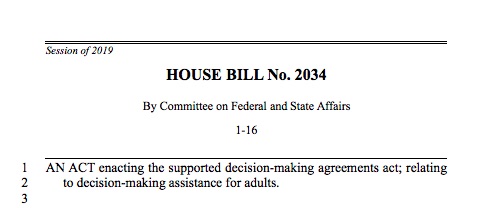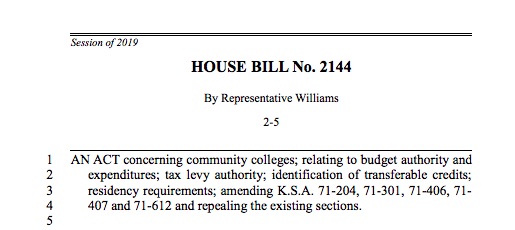HB 2175, sponsored by the House Committee on Commerce, Labor and Economic Development, would impose a monthly fee on any public employee who chooses not to join the union representing the employee’s bargaining unit. Kansas is a right-to-work state, which givies employees the right to choose whether to join a union and pay dues, but HB 2175 would effectively strip that right away. If, for example, a teacher chose not to join the Kansas National Education Association (KNEA) and the dues were $100 per month, HB 2175 would allow KNEA to assess that teacher between $85 and $100 per month against their will; 90 percent of the money would go to KNEA and 10 percent would go to a charity selected by the teacher.
The U.S. Supreme Court ruled in Janus v. American Federation of State, County and Municipla Employees (AFSME) that it’s unconstitutional to require public employees to pay union dues as a condition of employment. So which Kansas legislator is arguably proposing an unconstitutional deprivation of public employees’ right to choose?
At this writing, a citizen going to the Legislature’s website wouldn’t really know – because despite Kansas House rules that require the bill requestor’s name to appear in committee minutes, the minutes for the meeting in which the bill was introduced haven’t been posted.
The website says Rep. Stan Frownfelter, (D) Kansas City, requested introduction but committee chairman Sean Tarwater, (R) Stilwell, tells The Sentinel that committee minutes will reflect HB 2175 was introduced at the request of Rep. Jim Ward, (D) Wichita. Rep. Ward is not a member of the committee, so Rep. Frownfelter may have requested introduction on Ward’s behalf.

Transparency improved but legislators want more
Finding out who requested bills in the Kansas House is a little easier than it used to be. Lawmakers used to be able to introduce bills on behalf of anonymous constituents or lobbyists. The Kansas House rules now require that the bill requestor’s name appear in committee minutes, though it can sometimes take several days before committee minutes are posted on the Legislature’s website.
Within a few days of introduction, citizens should be able to learn who sponsored a House bill on the Kansas Legislature’s website but sometimes it takes much longer.
For example, the House today unanimously passed HB 2034, a bill that provides a statutory framework for adults who want decision-making assistance. It was introduced on January 16, and since then, it’s passed through the House Federal and State Committee and now worked its way through the House–halfway through the process to become law. The name of the sponsor isn’t on the legislation; instead, it appears there as if it was introduced by the Federal and State Affairs Committee.
It takes several more clicks and additional digging on the Kansas Legislature website to track down the date of its introduction and then to find the committee minutes from that date. Only there can concerned citizens learn that the bill was based on a guardian assistance bill from last year. Rep. Stephanie Clayton is its sponsors.
Being able to determine who requested a bill be introduced is a step in the right direction, says Clayton, an Overland Park Democrat, but she believes there’s still room for improvement.
“I think it should be at the top of every bill,” she said. It is on some. On others, it shows the committee. Rep. Clayton doesn’t know why her name isn’t listed as the bill’s sponsor.


She also advocates for requiring disclosure of bill sponsors in state law.
Right now, sponsor disclosure is in the House rules. The House adopts its own rules every two years, so that is subject to change depending on the makeup of the legislative body and on the Speaker of the House. It’s much harder to change a state law.
“I wanted this in statute, because statute is tougher to break,” she says.
The Senate adopts its rules once every four years. In March 2017, Senate leadership announced a series of transparency measures including listing bill requestors in minutes. At the time, Senate President Susan Wagle and Senate Majority Leader Jim Denning said the changes would ensure that Kansans–regardless of where they are in the world–can tune in as legislators debate issues.
“The first and best way to build trust in our legislature is to provide Kansas citizens the tools they need to easily and regularly interact with their government,” a Senate leadership press release read.
There are still a number of Senate bills that don’t show sponsors on the Legislature’s website, though bill requestors are named in committee meetings.
Harrison Hems, Wagle’s chief of staff, says old software is one reason finding a bill’s sponsor is challenging.
“The goal is to get it in the minutes for now, and later on down the road when we fix the program, you can see who introduced it,” he said. “The goal is to have the minutes reflect so you can at least get the information somewhere.”
Clayton says it shouldn’t be this hard.
“It’s amazing how things that are perfectly technologically possible are now insurmountable things,” she said.

